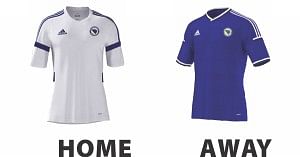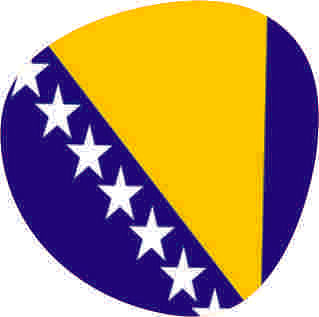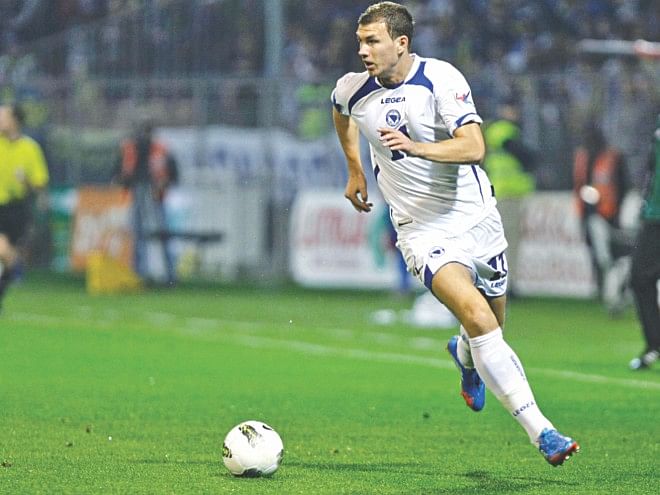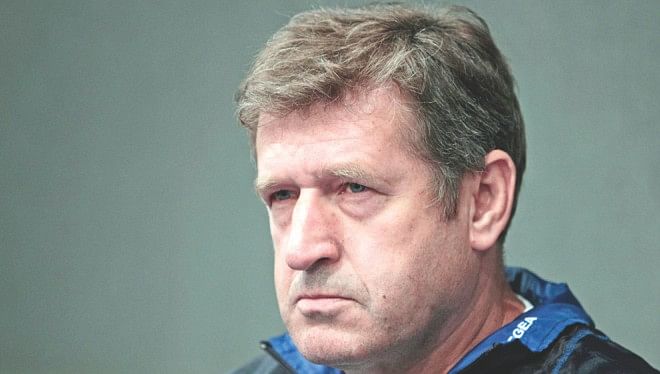Bosnia and Herzegovina

|
Rank: 25 World Cup appearances: Best result: Top SCORERS Did you know? Bosnia & Herzegovina's first FIFA recognised match came against Albania, just days after the Bosnian War ended in 1995.  |

Most teams heading to their maiden World Cup would probably be happy just to be there, but Bosnia and Herzegovina want more from a talented squad who stormed through qualifiers to reach their first major tournament as an independent nation.
With Edin Dzeko and Vedad Ibisevic scoring 18 of the team's 30 goals to form one of the most prolific strike partnerships in the qualifiers, Bosnia will fancy their chances against Group F rivals Argentina, African champions Nigeria and Iran.
While getting a result against the Argentines in their opening match at Rio de Janeiro's Maracana Stadium may be a tall order, the side coached by former Yugoslavia forward Safet Susic has every chance of reaching the knockout stages.
After missing out narrowly on the 2010 World Cup and Euro 2012, they stuck to their attack-minded approach which was richly rewarded. Much may hinge on the draw and the composition of Bosnia's group in the finals. If they are pitted against like-minded teams happy to take risks and throw men forward, Bosnia could treat their passionate fans to more delight and reach the last 16.
But having never previously qualified for a major tournament as an independent nation, lack of experience at the highest level and the unfamiliar schedule of playing three games in a short time-span mean heading into uncharted territory for a vastly entertaining Bosnian outfit.

STRENGTH
Striking duo
Bosnia and Herzegovina boast an incredibly dynamic offensive system with two natural goal-scorers in Dzeko and Ibisevic. The midfield is packed with creative talent and has decent depth.
WEAKNESS
Defence
If there's a weakness in this team, it's the defence, as despite its slow maturation and improvement, it struggles to find consistency. Right-back is a problem area due to injuries, and left-back is a swivel door.
ONE TO WATCH
Edin Dzeko
Having propelled the Balkan country in qualifying with 10 goals in as many games, Dzeko drew the wrath of Bosnia's fans and coach Safet Susic during a 2-0 friendly defeat by Egypt in March, when he was jeered from the terraces and fell out with Susic.

The 28-year-old striker was denied a substitution request at halftime and then put on a tepid second-half display, prompting Susic to criticise him after the game in Innsbruck and made it clear that not even a hitman of Dzeko's calibre was indispensable.
That outburst against him was rare as he is regarded as a superstar in his home nation, where he grew up with the trappings of success as his father was also a professional footballer.
There is no doubt, however, that that blip will be forgotten and Dzeko will lead the line for Bosnia in the World Cup as their hopes of progressing to the last 16 largely rest on his lethal finishing and a devastatingly effective strike partnership with Ibisevic, who scored eight goals in the qualifiers.
If Dzeko can get going when the going gets tough in a group including Argentina, African champions Nigeria and Iran, his country may yet enjoy the kind of football success few pundits thought was possible after Bosnia emerged as an independent nation from the ashes of the former Yugoslavia in the 1990s.
Coach: Safet Susic

For all the scoring prowess of Dzeko and Ibisevic, most lethal strike partnership in the World Cup qualifiers, it was the first hand of Bosnia's soft-spoken coach Safet Susic that steered a talented generation to the Balkan country's first major tournament as an independent nation. The 58 year old, a gifted forward who played for the former Yugoslavia in the 1982 and 1990 world cups, succeeded Croatian Miroslav Blazevic after Bosnia narrowly missed out on a 2010 World Cup spot.
Squad
Goalkeepers: Asmir Begovic (Stoke City), Jasmin Fejzic (Aalen), Asmir Avdukic (Borac Banja Luka)
Defenders: Emir Spahic (Bayer Leverkusen), Sead Kolasinac (Schalke), Ermin Bicakcic (Eintracht Braunschweig), Ognjen Vranjes (Elazigspor), Toni Sunjic (Zorya Lugansk), Avdija Vrsajevic (Hajduk Split), Mensur Mujdza (Freiburg)
Midfielders: Zvjezdan Misimovic (Guizhou Renhe), Haris Medunjanin (Gaziantepspor), Miralem Pjanic (Roma), Sejad Salihovic (Hoffenheim), Senad Lulic (Lazio), Izet Hajrovic (Galatasaray), Senijad Ibricic (Erciyesspor), Edin Visca (Istanbul BB), Tino Susic (Hajduk Split), Muhamed Besic (Ferencvaros), Anel Hadzic (Sturm Graz)
Forwards: Edin Dzeko (Manchester City), Vedad Ibisevic (Stuttgart)

 For all latest news, follow The Daily Star's Google News channel.
For all latest news, follow The Daily Star's Google News channel. 



Comments